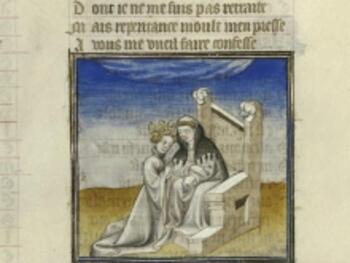La Faculté des Lettres
PAS building room 2401
Read in English
 Detailed manuscript information (based on Roman de la Rose: digital surrogates of medieval manuscripts and Anton von Euw and Joachim M. Plotzek, Die Handschriften der Sammlung Ludwig, Cologne: Schnügen-Museum, 1979-85, vol. 4:228-239.)
Detailed manuscript information (based on Roman de la Rose: digital surrogates of medieval manuscripts and Anton von Euw and Joachim M. Plotzek, Die Handschriften der Sammlung Ludwig, Cologne: Schnügen-Museum, 1979-85, vol. 4:228-239.)
Parchment, measure: 372 x 258mm, 138 folios, two columns, 44 lines.
Scène illustrée
La confession de Nature à Génius
Dimensions:
372x258mm
Miniature de la largeur d’une colonne
Hauteur: 12 vers
Matériaux et couleurs:
Parchemin
Feuille d’or, bleu, noir, gris
Encadrement:
Extérieur: encadrement simple en feuille d’or. Intérieur: fine bordure bleue et blanche
Paysage:
Il s’agit d’une tentative rudimentaire de reproduire une perspective atmosphérique. Le sol ressemble à du sable, ou à de la terre de couleur beige. Au-dessus du sol, la couleur du ciel passe du clair au foncé; il y a un nuage au sommet du ciel.
Emplacement de la miniature:
Immédiatement avant la réponse du prêtre
Lieu de production de la miniature:
Paris, France
Date de production de la miniature:
1405
Similitudes avec les autres images du corpus:
Des gestes semblables se trouvent dans les manuscrits suivants: BNF, Ms. fr. 12595, fol. 121r; PML, Ms. M. 132, fol. 121v; BNCF, Cod. Laur. Acq. e Donin 153, fol. 200v; Fitzwilliam Museum, Ms. 169, fol. 105v, BimUM, Ms. H245, fol. 102v.
Sources secondaires:
Euw, Anton von et Joachim M. Plotzek. Die Handschriften der Sammlung Ludwig. Cologne: Schnütgen-Museum, 1979-85, vol. 4: 228-239.
Allégories:
Dame Nature est à gauche.
Génius (le moine) est à droite.
Vêtements et d’autres caractéristiques:
*Semi-grisaille (Les figures sont dépeintes en grisaille; le paysage est en couleur.)
1. Dame Nature
Houppelande à col montant
Cheveux blonds dans une coiffure élaborée
Couronne en or
2. Génius (habillé en moine)
Longue robe blanche
Courte cape noire avec pampilles
Cheveux courts marron, tonsurés
Gestes:
Dame Nature s’agenouille, les mains jointes en prière et la tête s’incline vers le moine. Le moine est assis, le bras gauche posé sur ses genoux et le bras droit croisé sur son bras gauche. Il se baisse les yeux et regarde Dame Nature lorsqu’il écoute sa confession.
Objets:
Génius est assis sur une grande chaise en pierre grise avec des fioritures en haut. Représentation possible d’une cathèdre, auquel cas ce moine serait également un évêque.
The manuscript belongs to the most beautiful of the approximately three hundred extant Roman de la Rose manuscripts. Furthermore it is, with its 101 column-wide miniature paintings, one of the most richly decorated copies of the text that was so popular from its emergence into the 16th century.
![]() © The J. Paul Getty Museum
© The J. Paul Getty Museum
This work is licensed under a Creative Commons Licence © 2012
La Faculté des Lettres
PAS building room 2401
The University of Waterloo acknowledges that much of our work takes place on the traditional territory of the Neutral, Anishinaabeg, and Haudenosaunee peoples. Our main campus is situated on the Haldimand Tract, the land granted to the Six Nations that includes six miles on each side of the Grand River. Our active work toward reconciliation takes place across our campuses through research, learning, teaching, and community building, and is co-ordinated within the Office of Indigenous Relations.
Select 'Accept all' to agree and continue. You consent to our cookies if you continue to use this website.